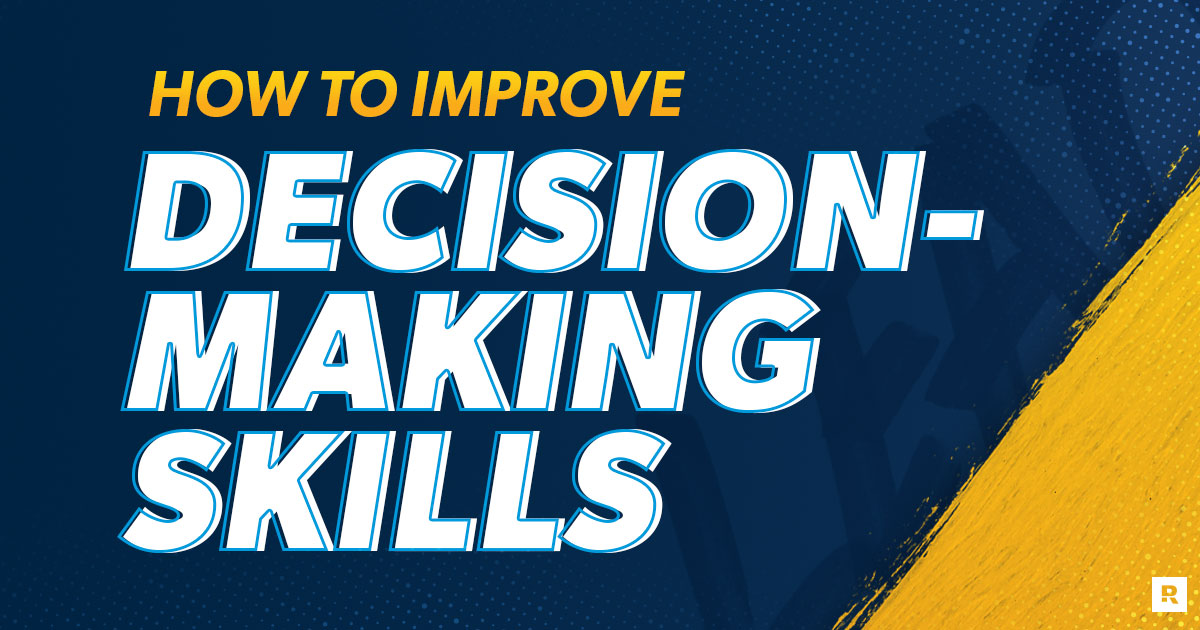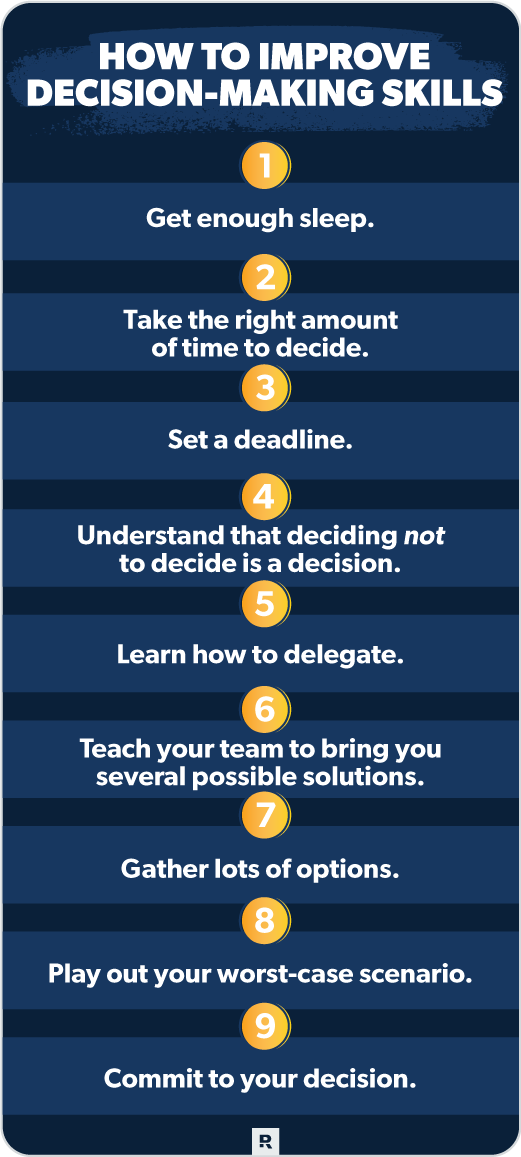
Sometimes being a leader means facing problems that don’t have easy solutions and making decisions that feel way above your pay grade. But as the saying goes, fortune favors the brave. If you want to win big in business, you’ll have to face uncharted territory time and again (even in decision-making)—guaranteed. Welcome to leadership.
What Are Decision-Making Skills?
So how do you get the confidence to see challenges as opportunities and make hard calls? You develop amazing decision-making skills. And what are decision-making skills? They help you weigh your options and make an informed choice. Here are some things to know to help you improve these skills—especially in your workplace.
Examples of Decision-Making Skills
When your decisions aren’t complicated, your automatic decision-making process kicks in so you can choose quickly, almost instinctively. Black shoes or sneakers? Foam or no-foam latte? An upbeat playlist or a moody one? Just pick one and keep moving!
But often in business, the stakes are higher—think leasing or buying a building space, making the right hire, or expanding your market reach—and you could lose a huge chunk of change, time or trust if you make the wrong decision. That’s when it’s time to call in these critical decision-making skills:
- Reasoning: This is when you analyze details and weigh the pros and cons logically—with emotions in check so you can stay neutral. Just the facts, ma’am.
- Intuition: At the other end of the logical, facts-based spectrum, you’ll find natural instincts. Intuition is less about analyzing deeply and more about following feelings and gut checks. As you get more experience and a solid track record for making decisions, you can give more weight to your instincts.
- Problem-solving: It’s been said that there are no big problems, just lots of little ones waiting to be solved. If you’re feeling overwhelmed by a big problem, try breaking it into smaller ones. It’s easier to unravel issues one knot at a time and get to the root cause.
- Creativity: This skill is problem-solving’s best friend. Creativity leads you to new ways of thinking, ideas and options (more on options later).
- Emotional intelligence: The best decision-makers are cool, calm and collected. No, not heartless robots, but leaders who are aware of their emotions and express them in healthy ways. That’s emotional intelligence. And when you use it, you’ll manage stress better and process decisions easier. Emotional intelligence helps you focus on how others feel and what they need—a win for those around you.
- Time management: Time is your friend when you manage it well. But it’s your worst enemy when you don’t. That’s why it’s so important to know when to slow your roll and let a decision simmer and when you need to charge ahead. Make sure you control the timing of a decision instead of letting it control you.
- Teamwork: Your best bet for making a complicated decision is to call in a special operations team. When you get the right mix of personalities and experiences beside you, you’ll learn more, come up with better ideas, and conquer challenges faster.
Free EntreLeadership Reading Guide
What should EntreLeaders read? We've got our list of book recommendations, with 100 book titles on topics like hiring, business strategy, sales, leadership and more!
How to Improve Decision-Making Skills
You’re not wrong if you’re sweating a little at the thought of how much practice it takes to develop these skills. Great decision-making takes work. But fear not. These do’s and don’ts will help you improve your decision-making ability—and raise your critical-thinking skills:
Do:
- Get enough sleep so you can think clearly. James Clear, the bestselling author of Atomic Habits, reminds us: “Your problems adjust to their true level of importance after a hard workout and a good night of sleep.”
- Take the right amount of time to decide. Acting on impulse is foolish and dangerous—but so is thinking yourself to death. If the impact of the decision is small, don’t waste too much time making the call. But if it’s big or risky, spend more time thinking it through.
- Set a deadline, or let the actual deadline sink in. This will help you overcome procrastination or freezing in fear of making the wrong choice. Put a date on your calendar and decide by that day.
- Understand that deciding not to decide is a decision—and sometimes it’s the best one you can make for the short term.
- Learn how to delegate so you have more brain space to make decisions.
- Teach your team to bring you several possible solutions, not just problems. If they come to your office with a problem and try to drop it on your desk for you to solve, teach them how to solve it and tell them to take their problem with them when they leave.
- Gather lots of options. We’ve already said that creativity is problem-solving’s best friend. What’s its other close friend? Options—because those who have the most options win. Options are the fruit of creative thinking and lead to amazing solutions! You’ll feel more confident and stay in the driver’s seat when you gather ideas and information, study what you’re dealing with, and conquer what might’ve seemed impossible before.
- Play out your worst-case scenario. It sounds like a Debbie Downer moment, but it’s actually just the opposite. When you think through the worst that could happen, you’ll see that making the call won’t kill you—even if you’re wrong.
- Commit to your decision and follow through.
Pro tip: Learn how keystone habits can help you create habits that make you a better decision-maker.
Don’t:
- Make decisions when you’re mad, afraid or weak. Come at them calm and classy.
- Dwell on the many roads not taken. Be bold. You can always course-correct if you get new information and need to adjust.
- Forget your guiding values. Stay aligned so you can keep your priorities straight.
- Let negative voices influence you. Criticism comes with the territory when you’re leading. Everyone has an opinion. But opinions are a lot like armpits—everybody’s got them, but most of them stink. Go win, and win big in spite of critics!
- Get distracted by too many options or feel limited by too few options. Find the sweet spot so you don’t get bogged down by infinite choices, but also don’t settle on dumb and dumber. There’s no perfect decision, just a few good ones.
- Doubt yourself once you decide. It will rob your satisfaction and momentum. Keep making calls based on what you know right now.
Related articles:
What Is Leadership Coaching?
27 Work-Life Balance Quotes for Motivation and Wisdom
What’s Next: Decide!
As you’re thinking through how to improve decision-making skills in the workplace (and in life), here’s what’s impossible: wishing away a decision or sweeping a challenge under a rug. It’s been said that tolerating a problem has the same consequence as failing to identify it: disaster.
But mastering decision-making skills gives you muscle to weigh your options wisely and make hard, brave choices. These skills make sure fear and inaction lose and you win! To hear stories and strategies from top business owners and thought leaders that will help you grow as a powerful decision-maker and leader, check out The EntreLeadership Podcast.


